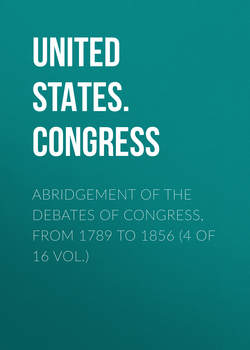Читать книгу Abridgement of the Debates of Congress, from 1789 to 1856 (4 of 16 vol.) - United States. Congress - Страница 71
TENTH CONGRESS. – SECOND SESSION.
PROCEEDINGS AND DEBATES
IN
THE HOUSE OF REPRESENTATIVES
Friday, March 3
ОглавлениеAdjournment
A message was received from the Senate, stating that they had appointed a committee in conjunction with such committee as should be appointed by the House, to wait on the President of the United States, and inform him that they had concluded the business pending before them, and were ready to adjourn. A committee was appointed on the part of this House to join the committee of the Senate.
Mr. Smilie offered the following resolution:
Resolved, That the thanks of this House be presented to Joseph B. Varnum, in testimony of their approbation of his conduct in the discharge of the arduous and important duties assigned to him whilst in the Chair.
Mr. Rowan moved that it be postponed indefinitely. Messrs. Rowan and Lyon supported the motion; and Messrs. Eppes and Jackson opposed it.
The resolution passed, 68 to 9.
The Speaker returned his acknowledgments to the House for this tribute of their approbation, as follows:
Gentlemen of the House of Representatives:
The kind expression of your approbation of my conduct, in the discharge of the duties which you have been pleased to assign me as Speaker of the House, affords me that consolation which an approving conscience alone can surpass. You will please, gentlemen, to accept my thanks for the liberality and candor which you have uniformly manifested towards me: and be assured, that the friendly aid which I have experienced from you in the discharge of my official duty, has made a deep impression on the affections of my heart, which length of time cannot eradicate.
Mr. Cutts, from the committee appointed to wait on the President, reported that they had performed that duty, and that the President had informed them that he had no further communication to make.
And the House adjourned sine die.4
4
This was the end of Mr. Jefferson's administration; and, notwithstanding the purchase of Louisiana, (the annual interest on the cost of which had to be paid,) and the greatly extended frontier which required to be guarded, the system of order and economy which he cherished enabled him to carry on the government (until the privations of the embargo and non-intercourse) without increase of duties, and with a moderation of cost which should form the study and the imitation of succeeding administrations. The duties remained at the same moderate rates as before – the ad valorems, 12½, 15, and 20 per centum; the specifics (increased in number) were not increased in rate; the free list not only remained undiminished, but was happily augmented by the addition of salt. The average of the ad valorems was still about 13 per cent., and almost all fell upon the 12½ per centum class – the importations under the other two classes being inconsiderable, to wit, only about half a million, ($520,000,) subject to the 20 per centum; and only a little over nine millions under the 15 per centum; while the imports under the 12½ per centum class amounted to above thirty-six millions of dollars. The articles used by the body of the people fell into this class, (the other two classes embracing articles which might be called luxuries,) so that 12½ per centum upon the value may be considered as the duty which fell upon the country. The expenses of collection still remained at about 4 per centum, and the revenue cutter service (there being but little temptation to smuggle under such low duties) cost but a trifle; and the specific list being considerable, the number of custom house officers and agents was inconsiderable. The revenue collected from the ad valorem duties was about seven millions of dollars; that from specifics about nine millions – leaving sixteen millions for the net revenue. Of that sum the one-half (just eight millions) went to meet the interest, and part of the principal, of the public debt. Of the remainder there went to the military and Indian departments about two and three-quarter millions; to the navy about one million; to tribute to Algiers, (masked under the name of foreign intercourse,) two hundred thousand dollars; and to the civil list, embracing the whole machinery of the civil government, with all its miscellaneous expenses, about nine hundred thousand dollars – leaving some two millions surplus after accomplishing all these objects. It was a model administration of the government. Mr. Jefferson's administration terminated the 3d of March, 1809, but its fair financial working ceased two years before – with the breaking up of our commerce under the British orders in council, and the decrees of the French emperor, and the measures of privation and of expense which the conduct of Great Britain and of France brought upon us. The two last years of his administration were a strong contrast to the six first, and a painful struggle against diminished revenue and increased expenses, injuries and insults from abroad, and preparation for war with one of the greatest powers in the world, while doing no wrong ourselves, and only asking for what the laws of nations and of nature allowed us – a friendly neutrality, and exemption from the evils of a war with which we had no concern. Preparation for war was then a tedious and expensive process; embargo, non-intercourse, fortifications, ships, militia, regular troops. All this is now superseded by railroads and volunteers, ready at any moment to annihilate any invading force; and by privateers, ready to drive the commerce of any nation from the ocean.
